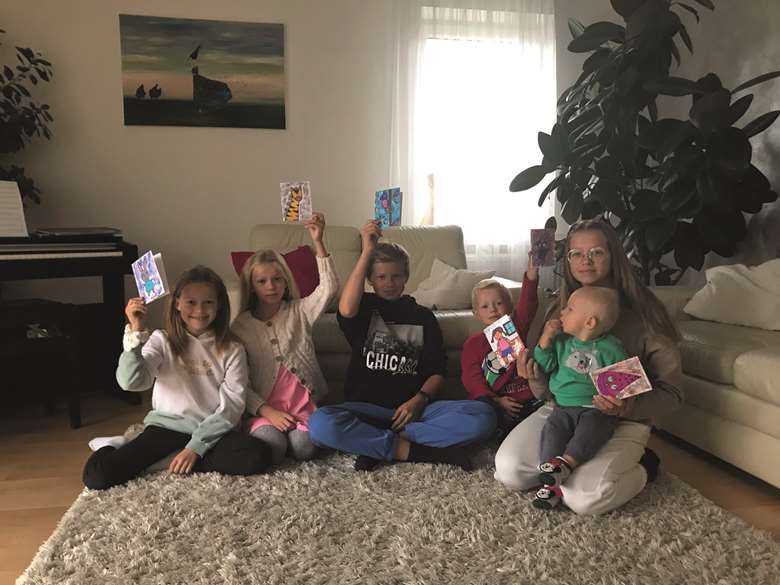Positive Relationships - Cards of hope
By Gabriella Jozwiak
Tuesday, November 22, 2022
Donating toys and making cards for child refugees of the war in Ukraine was a hugely positive experience for all the children involved at one setting. By Gabriella Jozwiak

When childminder Joanna Conroy saw children in her setting showing signs of distress as a result of the war in Ukraine, she and her team at Jelly Tot Lane in London developed a creative project to help them channel their feelings positively. As a result, over the summer break they sent about 40 hand-made cards and personal gifts to child refugees in Poland.
The project began when childminding assistant Inga Branka started a collection of donated items for Ukrainian refugees. In February, when the war broke out, Inga was visiting her hometown in Poland. She witnessed first-hand families fleeing across the border. ‘They only had one bag with them,’ she says. ‘It was absolutely awful, and I wanted to do something to help.’
She found an opportunity via a social media request reposted by a Polish television presenter. Maja Markowska, a Polish shopkeeper, had put out a call on Instagram for support for refugees in Ostrowiec Świętokrzyski, a Polish city about 200km from the Ukrainian border.
Inga responded by organising a collection of aid for the children. At the same time, Joanna saw an opportunity to help some of the 32 children in her setting who were finding news about the war upsetting. ‘Some of our children were directly involved as they had families in Ukraine, and they just did not know what was going to happen to them,’ she says. ‘For some of them, this was manifesting in drawings that were, I’d say, inappropriate. We had to find a way to give them a positive message.’
 Joanna says that although her team talked to the children about the war in an age-appropriate way, the project aimed to enable broader discussions about ‘doing something for someone else’ and ‘sharing something we have with someone in need’. The ‘doing something’ element involved children making cards for the Ukrainian children. And for ‘sharing’, Joanna asked parents to suggest to children they donate a pre-loved belonging. ‘We discussed how fortunate we all are to have what we have, and how different it is for families that don't have much,’ she says.
Joanna says that although her team talked to the children about the war in an age-appropriate way, the project aimed to enable broader discussions about ‘doing something for someone else’ and ‘sharing something we have with someone in need’. The ‘doing something’ element involved children making cards for the Ukrainian children. And for ‘sharing’, Joanna asked parents to suggest to children they donate a pre-loved belonging. ‘We discussed how fortunate we all are to have what we have, and how different it is for families that don't have much,’ she says.
The activity incorporated all ages of children at the setting. Inga and Joanna designed pictures based on what the shopkeeper said the Ukrainian children favoured, including Disney characters, cars and rockets. ‘We let the little children colour them or decorate them with glitter, then the after-school children wrote messages inside,’ says Inga. ‘Every card was the result of super, huge teamwork.’
The children also donated items including former baby blankets, clothes and toys. Ella, nine, who attends after school gave up her ‘worry monster’. ‘It's a cuddly toy but it has a zip in its mouth,’ she says. ‘You can unzip it and there's a space inside. You’re meant to write words that are your worries on a piece of paper and put them inside the worry monster, and they’re meant to go away.’
The children created at least 40 cards and gifts, which they collected into gift bags with stationery items and sweets. Isaac, aged seven, said the gifts would ‘help the children believe that they will win the war’.
When the Ukrainian children received the cards, Markowska says they were ‘completely enchanted. They were so moved that somebody in a different part of the world was thinking about them.’
Markowska and her husband do not have a background in early education, but felt compelled to help the Ukrainian families arriving in their city. They currently host at least two events a week for children aged from about two to 17 years. ‘We meet at my house where we have garden parties, or we take them to the swimming pool,’ she says. ‘I try to give them psychological support by organising something wonderful just to get a smile on their faces. We want them, just for a moment, to forget about the war and feel the same in Poland as they would in their own homes.’
Some of the Ukrainian children are now attending schools in the city. Most are there only with their mothers, as men aged between 18 and 60 are forbidden from leaving Ukraine to be called up to fight.
Inga has so far sent two vans full of donated items to the families from England. She says it is becoming harder for people like Markowska to support refugees because funding and attention is waning. ‘The war started more than half a year ago and some people forget. But the need continues,’ she says.
Download Now



